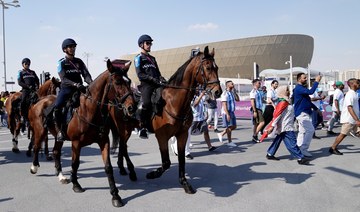PARIS/TEHRAN: Iranian security forces have killed 72 people, including 56 in Kurdish-populated areas, in the past week alone in their crackdown on the protests sparked by Mahsa Amini’s death, a rights group said Tuesday.
The protests, which erupted in mid-September following the death of Amini, 22, in the custody of the morality police, have turned into the biggest challenge for Iran’s clerical leadership since the 1979 revolution.
With the wave of protests cutting across ethnicities, social classes and provincial boundaries, authorities have responded with an intensifying crackdown that has sparked an international outcry.
Iran has also launched repeated cross-border missile and drone strikes, most recently Tuesday, against exiled Kurdish opposition groups it accuses of stoking the protests from their bases in neighboring Iraq.
Norway-based group Iran Human Rights said in its latest toll on the violence inside Iran that 416 people had been killed by security forces nationwide.
It said 72 people had lost their lives in the past week alone, including 56 in western Kurdish-populated areas where there has been an upsurge in protest activity over recent days.
Several towns in Kurdish-populated western Iran, including Mahabad, Javanroud and Piranshahr, have seen large protests, often starting at the funerals of those previously killed in the demonstrations.
The Norway-based Hengaw rights group, which focuses on Iran’s Kurdish areas, has accused Iranian security forces of directly firing on protesters with machine guns and shelling residential areas.
Hengaw said that five people were killed in Javanroud on Monday alone after thousands gathered for funerals for victims of the crackdown who were killed at the weekend.
The group said it had confirmed the killing of 42 Kurdish citizens of Iran in nine cities over the last week, almost all killed by direct fire.
Monitors also accused Iran of imposing a nationwide mobile internet blackout on Monday at the height of the protest activity.
Monitor Netblocks said that the mobile internet had now been restored after a “3.5 hour cellular data blackout” which also coincided with the refusal of Iran’s football team to sing the national anthem in the World Cup.
Freedom of expression group Article 19 expressed alarm that “reports of extreme state brutality continue out of Kurdistan alongside nationwide internet disruptions and shutdown.”
Hengaw meanwhile posted a video of protesters trying to remove birdshot pellets from the body of a protester with a knife, saying people were afraid to go to hospital for fear of being arrested.
According to figures collated by IHR, over half of those killed by the Iranian security forces in the crackdown have died in provinces populated by ethnic minorities.
It said 126 people had been killed in the southeastern province of Sistan-Baluchistan, largely populated by the Sunni Baluch minority, where the protests had a separate spark but fed into the nationwide anger.
Meanwhile 48 people have been killed in Kurdistan, 45 in West Azerbaijan and 23 in Kermanshah regions with a strong Kurdish presence, it said.
“Systematic killing of civilian protesters belonging to the Kurdish and Baluch minorities amounts to crimes against humanity,” said IHR director Mahmood Amiry Moghaddam.
The mainly Sunni Kurds, often described as one of the world’s largest stateless peoples, make up one of Iran’s most important non-Persian ethnic minority groups and also have significant minorities in neighboring Iraq and Turkiye as well as Syria.
The regime’s judiciary, meanwhile, said the country has arrested 40 foreign nationals during the protests.
“Forty foreign nationals implicated in the recent riots have been arrested,” judiciary spokesman Masoud Setayeshi said in comments carried by its Mizan Online news website.
Iranian officials have repeatedly accused Western governments of stoking the protests over Amini’s death.
A number of Westerners, some of them dual nationals, were already in custody in Iran before the latest protests broke out in September.
French teachers’ union official Cecile Kohler and her partner Jacques Paris were detained in May, following teachers’ strikes earlier in the year.
Both have been charged with espionage and have been held in isolation since their arrests, French trade union sources have said. “The two French spies remain in custody and their case is in the final decision stage,” Setayeshi said.
In early October, state television broadcast what it said were “espionage confessions” by the two French detainees.
The French government condemned the airing of the alleged confessions as “shameful, revolting and unacceptable” and described the pair as “state hostages” for the first time.
Five other French nationals are also in custody in Iran.
Iran’s courts have convicted nearly 2,500 people of involvement in the Amini protests, the judiciary spokesman said.
“Nationwide, preliminary verdicts have been handed down against 2,432 people so far.
A further 1,118 people have been charged and are awaiting trial in the capital Tehran,” Setayeshi said.
The verdicts handed down so far are all preliminary because they are subject to appeal to the supreme court.
The revolutionary court in Tehran has already handed down six death sentences over the protests after convicting the accused of being “enemies of God” or “corrupt on Earth,” both capital offenses in Iran.




























